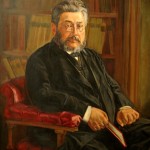 “But to all who did receive him, who believed in his name, he gave the right to become children of God, who were born, not of blood nor of the will of the flesh nor of the will of man, but of God.” – John 1:12-13
“But to all who did receive him, who believed in his name, he gave the right to become children of God, who were born, not of blood nor of the will of the flesh nor of the will of man, but of God.” – John 1:12-13
“But who receive Him thus? Not all by any means. Only a few. And is this left to chance? Far from it. As the following verse goes on to state, ‘which were born, not of blood, nor of the will of the flesh, nor of the will of man, but of God’ (John 1:13). This explains to us why the few ‘receive’ Christ. It is because they are born of God. Just as verse 12 gives us the human side, so verse 13 gives us the Divine.
The Divine side is the new birth: and the taking place of the new birth is ‘not of blood,’ that is to say, it is not a matter of heredity, for regeneration does not run in the veins; ‘nor of the will of the flesh,’ the will of the natural man is opposed to God, and he has no will Godward until he has been born again; ‘nor of the will of man,’ that is to say, the new birth is not brought about by the well-meant efforts of friends, nor by the persuasive powers of the preacher; ‘but of God.’
The new birth is a Divine work. It is accomplished by the Holy Spirit applying the Word in living power to the heart. The reception Christ met during the days of His earthly ministry is the same still: the world ‘knows him not;’ Israel ‘receives him not;’ but a little company do receive him, and who these are, Acts 13:48 tells us — ‘as many as were ordained to eternal life believed.'”
– A.W. Pink
C. H. Spurgeon brings out another truth from the same verses:
“Believe the doctrine of the Fatherhood of God to His people. Abhor the doctrine of the universal Fatherhood of God, for it is a lie and a deep deception.
It stabs at the heart, first, of the doctrine of adoption, which is taught in Scripture, for how can God adopt men if they are all His children already?
 In the second place, it stabs at the heart of the doctrine of regeneration, which is certainly taught in the Word of God. Now it is by regeneration and faith that we become the children of God, but how can that be if we are the children of God already? ‘But as many as received him, to them gave he power to become the sons of God, even to them that believe on his name: Which were born, not of blood, nor of the will of the flesh, nor of the will of man, but of God’ (John 1:12-13). How can God give to men the power to become His sons if they have it already?
In the second place, it stabs at the heart of the doctrine of regeneration, which is certainly taught in the Word of God. Now it is by regeneration and faith that we become the children of God, but how can that be if we are the children of God already? ‘But as many as received him, to them gave he power to become the sons of God, even to them that believe on his name: Which were born, not of blood, nor of the will of the flesh, nor of the will of man, but of God’ (John 1:12-13). How can God give to men the power to become His sons if they have it already?
Believe not that lie of the devil, but believe this truth of God, that Christ and all who are by living faith in Christ may rejoice in the Fatherhood of God.”
– C. H. Spurgeon, ‘Our Lord’s Last Cry from the Cross.’
“Regeneration is the work of God’s invincible power and mere grace, wherein by his Spirit accompanying his Word he quickeneth a redeemed person lying dead in his sins and reneweth him in his mind, his will and all the powers of his soul, convincing him savingly of sin and righteousness and judgment, and making him heartily to embrace Christ and salvation, and to consecrate himself to the service of God in Christ all the days of his life.” – David Dickson, Select Practical Writings of David Dickson, Vol. 1 (Edinburgh: Printed for the Assemblies Committee, 1845), p. 211.
 When we look at the context of John chapter 6 we discover there are numerous parallel passages that allow us to get a clear glimpse into what is meant here.
When we look at the context of John chapter 6 we discover there are numerous parallel passages that allow us to get a clear glimpse into what is meant here.
 Acts 16: 11 So, setting sail from Troas, we made a direct voyage to Samothrace, and the following day to Neapolis, 12 and from there to Philippi, which is a leading city of the district of Macedonia and a Roman colony. We remained in this city some days. 13 And on the Sabbath day we went outside the gate to the riverside, where we supposed there was a place of prayer, and we sat down and spoke to the women who had come together. 14 One who heard us was a woman named Lydia, from the city of Thyatira, a seller of purple goods, who was a worshiper of God. The Lord opened her heart to pay attention to what was said by Paul. 15 And after she was baptized, and her household as well, she urged us, saying, “If you have judged me to be faithful to the Lord, come to my house and stay.” And she prevailed upon us.
Acts 16: 11 So, setting sail from Troas, we made a direct voyage to Samothrace, and the following day to Neapolis, 12 and from there to Philippi, which is a leading city of the district of Macedonia and a Roman colony. We remained in this city some days. 13 And on the Sabbath day we went outside the gate to the riverside, where we supposed there was a place of prayer, and we sat down and spoke to the women who had come together. 14 One who heard us was a woman named Lydia, from the city of Thyatira, a seller of purple goods, who was a worshiper of God. The Lord opened her heart to pay attention to what was said by Paul. 15 And after she was baptized, and her household as well, she urged us, saying, “If you have judged me to be faithful to the Lord, come to my house and stay.” And she prevailed upon us. “But to all who did receive him, who believed in his name, he gave the right to become children of God, who were born, not of blood nor of the will of the flesh nor of the will of man, but of God.” – John 1:12-13
“But to all who did receive him, who believed in his name, he gave the right to become children of God, who were born, not of blood nor of the will of the flesh nor of the will of man, but of God.” – John 1:12-13 In the second place, it stabs at the heart of the doctrine of regeneration, which is certainly taught in the Word of God. Now it is by regeneration and faith that we become the children of God, but how can that be if we are the children of God already? ‘But as many as received him, to them gave he power to become the sons of God, even to them that believe on his name: Which were born, not of blood, nor of the will of the flesh, nor of the will of man, but of God’ (John 1:12-13). How can God give to men the power to become His sons if they have it already?
In the second place, it stabs at the heart of the doctrine of regeneration, which is certainly taught in the Word of God. Now it is by regeneration and faith that we become the children of God, but how can that be if we are the children of God already? ‘But as many as received him, to them gave he power to become the sons of God, even to them that believe on his name: Which were born, not of blood, nor of the will of the flesh, nor of the will of man, but of God’ (John 1:12-13). How can God give to men the power to become His sons if they have it already?